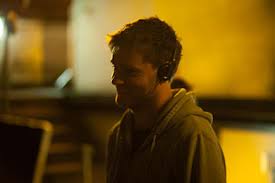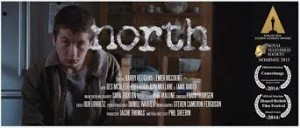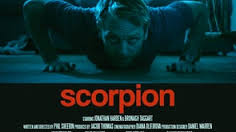 Act The Maggot’s Amy Redmond chats to London-based director Philip Sheerin for Film Ireland online. Full text below.
Act The Maggot’s Amy Redmond chats to London-based director Philip Sheerin for Film Ireland online. Full text below.
Amy Redmond chats to multi-award winning writer/director Phil Sheerin.
Now in his third year living in the U.K., budding Irish filmmaker Philip Sheerin is going places. Having graduated with a Masters in Film in March of this year from London’s prestigious National Film and Television school (NFTS), he has already ratcheted up several awards and has gotten into heaps of film festivals worldwide with his acclaimed short film, North. This latest short from Philip Sheerin has already been screened as part of the BAFTA new talent showcase in 2014 and this year it was one of the finalists in the Foreign Category for 2016 Academy Awards for students.
 The 22-minute film, North, which he wrote and directed, sees the world through the eyes of a teenage boy, Aaron, who lives on a farm in rural Ireland and is struggling with his mother’s illness and eventual death from cancer. It’s a beautifully paced, poignant portrait of what it is like for a son to live with his sick mother and how he has to deal with the choices she makes.
The 22-minute film, North, which he wrote and directed, sees the world through the eyes of a teenage boy, Aaron, who lives on a farm in rural Ireland and is struggling with his mother’s illness and eventual death from cancer. It’s a beautifully paced, poignant portrait of what it is like for a son to live with his sick mother and how he has to deal with the choices she makes.
It took Sheerin four months to fine tune the script that had more than twenty drafts. During this period in his life, his own mother was ill with cancer back in Ireland. Although, she has recovered now, at the time, she had undergone invasive surgery and suffered massive post-operative complications. All of those feelings, fears and experiences in his own family coupled with being forced to come up with ideas for his MA film project, influenced his writing of North. Sheerin says working with the actors was an amazing experience and he seems to be confident on set dealing with performers. He owes this to the years he spent at the Factory Space in Dublin where he worked after his undergraduate degree at Dun Laoghaire film school. At the Factory, a former filmmaking collective, he worked side by side with Kirsten Sheridan, Maureen Hughes and Lance Daly and learned not to be afraid of actors.
“Actors can ask some pretty bonkers questions?” he says laughing and knows that listening to them is key. He believes it is important to strip away your own ego as a director and be open to their suggestions. He learned to think on his feet, something you will always have to do once you get onto any shoot. He doesn’t mind if actors want to ad lib but there are some conditions. “If an actor knows what they are dong in the scene, what they want, why the scene is in the film, if they really understand that,” then he is happy to let them ad lib. The first barrier he explains is, “do I believe it?” When making film, time and money will always kill you “but I will always choose a good performance over everything,” he explains.
He emphasizes the importance of casting and gives a nod the casting directors and agents he has worked with who due to their expertise, have helped him make the right choices. “You need to get the right actor and when you do, it blows it right open,” he says. Working on North was an amazing experience for Sheerin, which he feels was a major coup in casting, particularly the young lead, Barry Keoghan, whom he reckons will go on to make great work.
 “Being on a shoot can be incredibly stressful but also really exhilarating,” he explains. Budgets and time are tight, often there may be little or no time for rehearsal and then there are the factors that are beyond your control. The most stressful shoot he was ever on was, filming one of his earlier shorts, Scorpion, a psychological portrait of a young soldier with survivor’s guilt. “The weather was kicking our asses, the camera kept breaking, everyone was testy.” His big challenge was holding morale because in such adverse conditions, what should have taken a couple of hours took a whole day. He much prefers location shooting than studio. Though, there are factors that are uncontrollable, there is beauty in the madness he says, as such chaos can and did turn up something amazing.
“Being on a shoot can be incredibly stressful but also really exhilarating,” he explains. Budgets and time are tight, often there may be little or no time for rehearsal and then there are the factors that are beyond your control. The most stressful shoot he was ever on was, filming one of his earlier shorts, Scorpion, a psychological portrait of a young soldier with survivor’s guilt. “The weather was kicking our asses, the camera kept breaking, everyone was testy.” His big challenge was holding morale because in such adverse conditions, what should have taken a couple of hours took a whole day. He much prefers location shooting than studio. Though, there are factors that are uncontrollable, there is beauty in the madness he says, as such chaos can and did turn up something amazing.
As a writer and director, he is more interested in high-stakes personal or family dramas. He likes the gritty, adult themes. “Unless someone is dying or dies, I lose interest,” he explains with a grin. “My mother wants me to make happy films. I like to watch them but I don’t have it in me to make them,” he says. His influences in early life, he owes to his two film-buff brothers, Richard and John, who introduced him to all sorts of films. He remembers watching Apocalyse Now at 12 and The Shining is his all time favourite. He loves Stanley Kubrick’s work, the themes, the obsessions and he watches it over and over again. Every time he watches, he learns something new. He says the more he has studied and made films, the more indiscriminate he has become with what he watches. He admits now to appreciating intellectual filmmakers, like Tarkovsky, whereas in his younger years such work would have induced a long rant from him!
He prefers character and scene development rather than plot-driven writing. “Focusing on plot feels forced and corny,” he says and for inspiration, artists such as Lumet, Spielberg, Altman, Meadows, Haneke, and Lynch rank highly. He’s big into efficiency of filming and telling the story through camera movement and shots rather than leaving it to the editing process. In terms of process, he keeps notebooks and every day he either works on something of his own or writes notes on someone else’s work. The big advantage in having gone to film school is the calibre of your peers and the various influences you are exposed to, from Irish, British, Icelandic, Dutch and Chinese filmmakers, his network is large and supportive. He has met some really talented inspiring people who he consistently works with and these friends and colleagues, keep him going in such a relentlessly competitive industry.
Only now, he is realizing how getting his short films into festivals, is his major calling card for production companies. He seems to have cracked it though, having beat out the competition of thousands of entrants to get North screened all over the world.
So what next? Sheerin is realistic and knows he has a tough road ahead of him. He’s happy to serve pints or cocktails in London in between shoots but does hope to move to Oxford where he can take advantage of the cultural life around as London is expensive. He has no intention of going back to aircraft engineering, his first career and is sticking with film. He’s scouting for funding in the U.K. and the U.S. for two new shorts, is writing a TV series and just shot a music video in Morocco.
When asked what actors he’d like to work with in the future, he unreservedly says, “Barry Keoghan again – he’s going to be huge”. He also has his eye on Jake Gyllenhaal, whom he admires. He’s happy to keep doing what he does, “making films to try and understand the human condition”. Writing is such a solitary experience and though he enjoys it, he would like to find another writer that he can work with. He’s a big comic book fan and hasn’t ruled out making a Batman movie at some point. He is keen to cut his teeth with a feature film but is willing to wait for the right idea. He is busy working to make that happen and has five different ideas on the go at the moment. He has never applied to the Irish Film Board but plans to in the future when the right project pops up.
Watch this space.
Favourite film: The Shining.
Favourite book: To Kill A Mocking Bird.
Favourite play: Silence by Pat Kinevane.
Favourite place: Home to see my mam.
